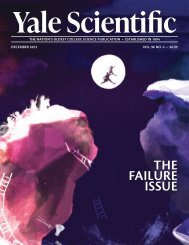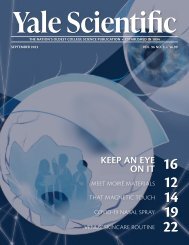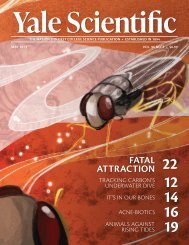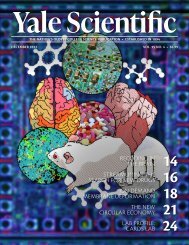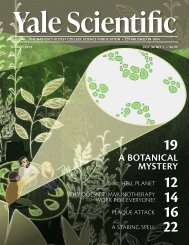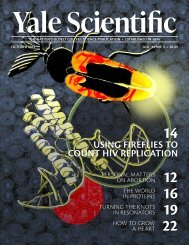YSM Issue 87.2
You also want an ePaper? Increase the reach of your titles
YUMPU automatically turns print PDFs into web optimized ePapers that Google loves.
alumni profile
Robert Needlman (YC ’81, YSM ’85)
BY EMMY YANG
FEATURE
from english to pediatrics
In some ways, Robert Needlman (YC ’81, YSM ’85) is the modernday
Benjamin Spock. Both men studied English at Yale, and both
were interested in medicine alongside literature and language. As a
pediatrician at MetroHealth Medical Center and a professor at Case
Western Reserve University, Needlman is now tasked with updating
the classic parenting book trusted by expectant mothers and fathers
everywhere — “Dr. Spock’s Baby and Child Care.
Benjamin Spock was a famous 20th century pediatrician who first
published “Baby and Child Care” in 1946. It became the second
best-selling book in America after the Bible, and is currently in its
9th edition. Needlman is similarly talented. He has found a way to
combine his love of writing with his interest in science, primarily
pediatric medicine. From an English degree to an MD, Needlman has
demonstrated the value of a liberal arts background in the medical
profession.
Needlman first began to work on Spock’s legacy by writing for
drspock.com, a website that sparked his full-time commitment to
thinking about the kinds of issues Spock used to write about, such
as child developmental and behavioral disorders. Needlman went on
to revise the 8th and 9th editions of Spock’s famous book, which
contain updated sections on topics such as obesity and nutrition,
environmental health, and immunizations. Parenting, according to
Needlman, is a “moving target.” Thus, the book must be continually
updated as new research and information about parenting surfaces.
Though some consider English and medicine distinct fields,
Needlman sees an intuitive overlap. “What draws people to literature
is that it is a way of understanding human experience. Medicine is
also about appreciating and understanding the human experience,”
Needlman said. He supposed that Spock might have been interested
in development and child psychiatry for this same reason. “What was
www.yalescientific.org
IMAGE COURTESY OF GOODREADS
Like many current students, Needlman attended English lectures in
Linsly-Chittenden Hall. One of his favorite classes was Daily Themes.
Needlman works in Cleveland, teaches at Case Western Reserve
University, and gives talks about developmental-behavioral pediatrics.
interesting to me about English literature was the stuff that dealt
with how we got to be the way we are – how our experience shapes
who we are,” Needlman added.
At Yale, Needlman’s favorite classes included an English lecture
by Marie Borroff and Daily Themes with John Hollander. When
asked how he balanced his science and humanities classes at Yale,
Needlman laughed. “I have no idea. I haven’t been that efficient in
a long time,” he said. He added that his science classes provided an
enjoyable break from his English classes. Looking back, Needlman
felt that all the anxiety of writing English papers was worth it because
knowing how to write well “is a real plus as a doctor.”
After graduating from Yale College, Needlman decided to attend
the Yale School of Medicine. In his third year of medical school in
1984, he realized he wanted to be a pediatrician. Interacting with
parents and children felt like a good fit to him, and he became
emotionally invested in pediatric care. Though medical school was
filled with all-nighters, Needlman delighted in attending lectures and
learning about different parts of medicine. After his residency and
fellowship, Needlman began to work in developmental-behavioral
pediatrics, a relatively new subspecialty. As physical disorders became
less severe, doctors began to focus on more complex issues such
as obesity and behavioral disorders. In addition to his work at
MetroHealth and Case Western, Needlman recently gave workshops
at a Developmental-Behavioral Pediatrics Review in Atlanta.
Throughout his successful trajectory in the field of medicine,
Needlman continues to draw upon the lessons he learned at Yale,
whether it is in taking care of patients, teaching, or working with
colleagues. “The best of a Yale education, I’m convinced, is your
classmates,” Needlman reflected. He advises current students that
relationships with professors are important, but relationships with
peers are indispensable. “Delve wholeheartedly into your experience.
Going to a place like Yale is really a privilege. It is worth keeping
that in mind,” said Needlman. Living up to the privilege of a Yale
education is exactly what Robert Needlman has done for himself —
understanding humanity in the earliest stages of life.
March 2014
IMAGE COURTESY OF YOUTUBE
Yale Scientific Magazine
33




